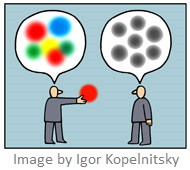 Sometimes poor writing is not the result of laziness or a desire to be obscure, it’s just because we know the content too well.
Sometimes poor writing is not the result of laziness or a desire to be obscure, it’s just because we know the content too well.
When you know something really well it is extremely difficult to imagine not knowing it. That makes it hard to share knowledge with others because you can’t easily put yourself in your readers’ shoes. It’s like trying to un-see or un-hear something.
The first principle of writing clearly is to understand your users or readers; to understand their needs, wants, interests and mind set. But that is really hard to do if you are an expert trying to communicate with non-experts.
Experts immerse themselves in the subject for years. They end up speaking and writing using abstract terms to summarise all the concrete data in their heads. They describe ‘replacing the bolt’ as ‘taking corrective measures’, or ‘wind and rain’ as ‘unfavourable weather’, or ‘stopping pollution’ as ’emissions reduction’. But novices don’t get it. They only hear vague phrases.
Experts forget how difficult it has been to acquire knowledge. They now see much of their knowledge as ‘obvious’ or ‘common sense’.
Elizabeth Newton illustrated the curse of knowledge in a simple game. A “tapper” was asked to tap out the rhythm of a well-known song, such as “Happy Birthday”. The listener’s job was to guess the song. Newton asked the tappers to predict the probability that listeners would guess correctly. They predicted 50%, but listeners actual success rate was 2.5%. The reason for such a difference? The tapper can’t avoid hearing the tune in their head playing with the taps, but all the listener can hear is a kind of Morse code.
Deliberately working to put yourself in the users’ shoes is a start, but doesn’t really solve the problem. The only solution is to test what you have written. Ask your user, or a surrogate user, what they understand from your writing.
(inspired by reading Steven Pinker’s book, The Sense of Style)